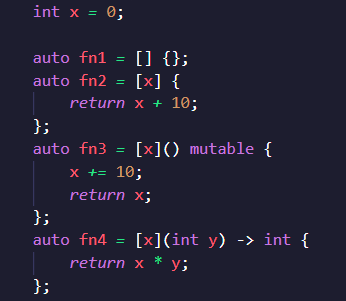Original link: https://ifmet.cn/posts/9ece64cc/
Brief Description: Explain the basic usage, principles, and usage scenarios of Lambda expressions in detail.

[TOC]
This article was originally published on ” Xie Zang’s Small Station “, and is reproduced here simultaneously.
Lambda expressions
grammar
[captures](params) mutable exception -> ret {body}
• Capture table columns, capturing variables in the current scope, separated by commas
• parameter list
• The optional qualifier, optional, mutable allows changing captured-by-value variables within the body of the function
• exception specifier, optional, noexcept
• Return value type, optional, in most cases can be automatically deduced by the compiler
• Function body
capture list
-
[var] Capture by value, copy var to Lambda scope by value, cannot be modified by default
-
[&var] capture by reference, captures the reference of var into the lambda scope
-
[=] captures the value of all variables in its scope
-
[&] captures references to all variables in the scope
-
[this] In the member function of the class, capture the current this pointer
Initialize capture
Initialization capture: C++14 support, when capturing variables, you can
• Specify the name of the data member in the closure class
• Direct capture of the result of an expression

principle
• Lambda expressions:
Rvalue expression, which is part of the source code, instructs the compiler to generate the corresponding closure class and closure object
• Closure class:
Generated by the compiler at compile time based on Lambda expressions, each Lambda expression has a corresponding unique closure class
• Closure:
The closure class instance created at runtime, the call to the Lambda expression is to call the member function of this instance
Divided into闭包类– 捕获变量and闭包类– 不捕获变量;
Lambda expression usage scenarios
• Create variables to store lambda expressions
• Lambda expressions as function parameters
• Lambda expressions as class data members
• Using containers to store lambda expressions
Defining Lambda Expression Variables with auto and decltype
auto f = [ y ] ( int x ) { return x * y ; } ; //右值初始化auto f2 = f ; //拷贝decltype ( f ) f3 = std :: move ( f ) ; //移动auto && f4 = [ y ] ( int x ) { return x * y ; } ; //右值引用绑定右值const auto & f5 = f4 ; //常量左值绑定
Parameterizing Lambda Expression Types Using Templates
template < typename F > void fn1 ( F fn ) { fn ( ) ; } template < typename F > void fn2 ( F && fn ) { fn ( std :: forward < F > ( fn ) ) ; }
std::function function object wrapper
-
Can wrap any type of function object
-
Objects with the same function signature can be stored as the same type
std :: function < float ( float , float ) > fn ; fn = std :: fmaxf ; //普通函数fn = std :: multiplies < float > ( ) ; //仿函数fn = [ x ] ( float a , float b ) { return a * b ; } ; // Lambda
performance issues
-
Dynamically allocate memory
-
virtual function call
pointer
-
Dangling references
auto make_lambda ( int i ) { return [ & ] ( int v ) { return v + i ; } ; } auto l = make_lambda ( 10 ) ; l ( 20 ) ; -
hanging pointer
void Object :: f ( int i ) { std :: thread ( [ = ] { print ( i + m_value ) ; } ) . detach ( ) ; }
This article is reprinted from: https://ifmet.cn/posts/9ece64cc/
This site is for inclusion only, and the copyright belongs to the original author.
